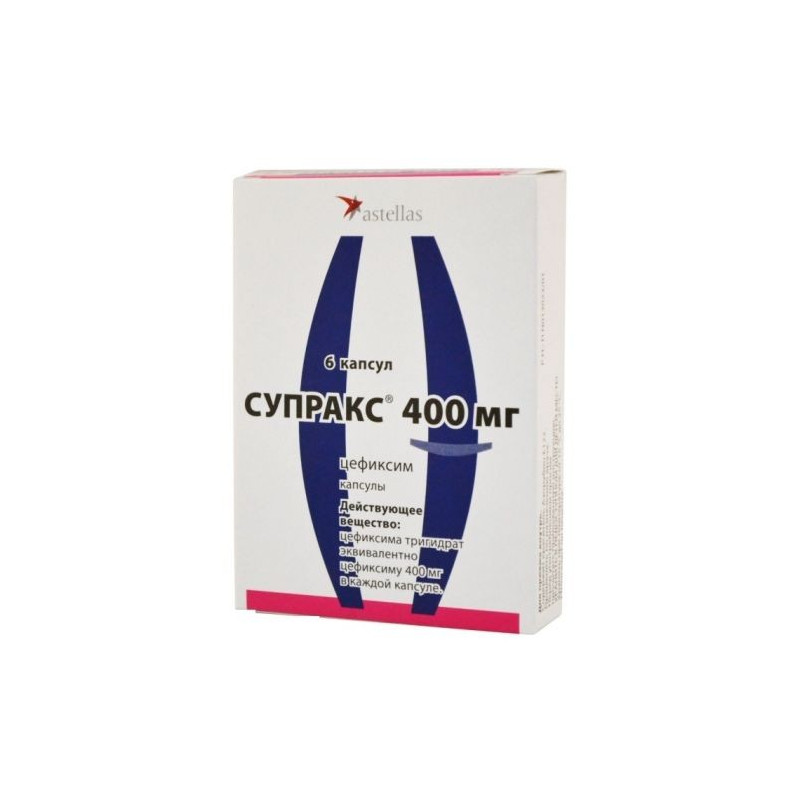



 All payments are encrypted via SSL
All payments are encrypted via SSL
 Full Refund if you haven't received your order
Full Refund if you haven't received your order
6 pieces
SUPRAX - a semi-synthetic cephalosporin antibiotic of a broad spectrum of action of the III generation for intake. Bactericidal effect. The mechanism of action is due to inhibition of the synthesis of the cell membrane of the pathogen. Cefixime is resistant to β-lactamase produced by most gram-positive and gram-negative bacteria.
In vitro and in clinical practice, cefixime is active against gram-positive bacteria: Streptococcus pneumoniae, Streptococcus pyogenes; Gram-negative bacteria: Haemophilus influenzae, Moraxella (Branhamella) catarrhalis, Escherichia coli, Proteus mirabilis, Neisseria gonorrhoeae.
In vitro, cefixime is active against gram-positive bacteria: Streptococcus agalactiae; Gram-negative bacteria: Haemophilus parainfluenzae, Proteus vulgaris, Klebsiella pneumoniae, Klebsiella oxytoca, Pasteurella multocida, Providencia spp., Salmonella spp., Shigella spp., Citrobacter amalonaticus, Citrobacter diversus-synsus, an example, Syro.
Pseudomonas spp., Enterococcus (Streptococcus) serogroup D, Listeria monocytogenes, Staphylococcus spp. (including methicillin-resistant strains), Enterobacter spp., Bacteroides fragilis, Clostridium spp.
Infectious and inflammatory diseases caused by microorganisms sensitive to the drug:
- pharyngitis;
- tonsillitis;
- sinusitis;
- acute and chronic bronchitis;
- otitis media;
- uncomplicated urinary tract infections;
- uncomplicated gonorrhea.
- impaired renal function with a CC of less than 60 ml / min (for capsules);
- children's age up to 12 years (for capsules);
- hypersensitivity to cephalosporins and penicillins.
With caution, Suprax should be prescribed to elderly patients, patients with chronic renal failure or pseudomembranous colitis (in history), in the form of granules for suspension preparation - to children under 6 months.
Use of Supraksa during pregnancy is possible only when the intended benefit to the mother outweighs the potential risk to the fetus.
If necessary, use Supraksa during lactation should stop breastfeeding.
For adults and children over 12 years old with a body weight of more than 50 kg, the daily dose is 400 mg 1 time / day. Duration of treatment is 7-10 days.
For uncomplicated gonorrhea, 400 mg is administered once.
Children under the age of 12 years, the drug is prescribed in the form of a suspension in a dose of 8 mg / kg body weight 1 time / day or 4 mg / kg every 12 hours.
For children aged 5-11 years, the daily dose is 6-10 ml of suspension, at the age of 2-4 years - 5 ml, at the age of 6 months to 1 year - 2.5-4 ml.
For infections caused by Streptococcus pyogenes, the treatment should be at least 10 days.
In cases of impaired renal function (with CC from 21 to 60 ml / min) or in patients on hemodialysis, the daily dose should be reduced by 25%.
With QC ≤ 20 ml / min or in patients on peritoneal dialysis, the daily dose should be reduced by 2 times.
Patients with impaired renal function with a CC of less than 60 ml / min who are on hemodialysis or peritoneal dialysis should be prescribed in the form of a suspension.
Suspension preparation rules
Flip the bottle and shake the granules. Add 40 ml of boiled water cooled to room temperature in 2 stages and shake after each addition to form a homogeneous suspension. After that, it is necessary to allow the suspension to settle for 5 minutes to ensure complete disintegration of the granules. Before use, the finished suspension should be shaken.
Gastrointestinal: dry mouth, anorexia, nausea, vomiting, diarrhea, constipation, abdominal pain, flatulence, transient increase in liver transaminase and alkaline membrane activity, hyperbilirubinemia, jaundice, candidiasis of the gastrointestinal tract, dysbacteriosis; rarely - stomatitis, glossitis, pseudomembranous enterocolitis.
Hemic and lymphatic: leukopenia, thrombocytopenia, neutropenia, hemolytic anemia, pancytopenia, aplastic anemia, bleeding.
From the side of the central nervous system: dizziness, headache.
Urogenital: interstitial nephritis, impaired renal function, acute renal failure.
Allergic reactions: pruritus, urticaria, skin hyperemia, eosinophilia, fever, erythema multiforme exudative, toxic epidermal necrolysis, anaphylactic shock.
From the laboratory indicators: increase of urea nitrogen, hypercreatininemia, an increase in prothrombin time.
Other: candidiasis, shortness of breath, the development of hypovitaminosis B.
Symptoms: increased manifestations of the described side effects, with the exception of allergic reactions.
Treatment: gastric lavage; carry out symptomatic and supportive therapy, which, if necessary, includes the use of antihistamines, GCS, epinephrine, norepinephrine, dopamine, oxygen therapy, transfusion of infusion solutions, mechanical ventilation. Cefixime is not excreted in large quantities from the circulating blood by hemo - or peritoneal dialysis.
At a temperature from 15 ° to 25 ° С.
3 years
Suprax